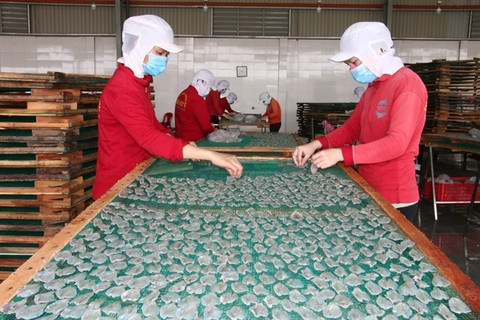
Workers process fried fish fillets for export in a facility in Ben Tre Province. Experts believe the home market would buffer the impact of the global trade downturn. — VNA/VNS Photo Cong Tri
Global consumers are cutting back on non-essential items as high inflation has eroded their budgets. The switch in purchasing patterns has dealt a blow to the country's commercial performance.
The country's total imports and exports stood at US$230.6 billion by mid-May, down 15.4 per cent against the same period in 2022. With such a figure, it remains elusive for Viet Nam to achieve in 2023 what it pulled off last year.
Than Duc Viet, Director-General of the Garment 10 Corporation JSC, said his company had been hard-hit by the global weakening demand. Its orders fell by 10 per cent in Q1 and by more than double that in Q2.
He cited the surge of trade remedy investigations in certain large importers as the main cause of the fall in export. Another cause involves rising feedstock costs, which have undermined the country's price advantages.
The categories of export taking the full brunt of the global economic downturn included smartphones, computers, electronic equipment, clothes, and footwear.
Economist Pham Sy Thanh said global trade was declining in the wake of rising mercantilism and protectionism. Viet Nam would be among the countries on the receiving end of the restrictive policies on trade.
"Not only does the change in trade patterns increase risks to exports but also costs to the economy," said Thanh.
A rough estimate suggests that Viet Nam must bring off around $500 billion in trade for the rest of this year to repeat last year's commercial feat ($730 billion). Such a goal seems unfeasible for the country in the current situation.
Economist Dinh Trong Thinh urged Vietnamese firms to strengthen ties with their traditional trade markets, such as the EU, to hold ground against the trade headwinds.
He also underlined the role of domestic consumption in cushioning the impact of the trade downturn. With a population of 100 million, Viet Nam is a large market that firms can leverage to offset their drop in sales elsewhere.
"The gross retail sales of goods and services rose in Q1/2023, indicating a rising domestic consumption demand. Boosting sales at home should be top of mind in the current situation," said Thinh.
Economist Vu Vinh Phu shares Thinh's view. He said domestic consumption would become the workhorse of the economy given public investment and exports being on the decline.
With 50 per cent of its population being young people, Viet Nam has a vast commercial potential waiting to be unlocked. Exporters, he said, should expand their market reach at home to exploit such a large 'gold mine'.
"Exporters should turn to their home market because people's income is forecast to edge higher this year," said Phu.
Deputy Minister of Industry and Trade Do Thang Hai said the ministry was actively assisting firms in promoting their trade to new markets, including India and the Middle East, to prop up the country's commercial performance.
The ministry is also pressing ahead with digital transformation to reduce the time required for obtaining a Certificate of Origin, thereby lightening the compliant burden on firms trying to leverage Free Trade Agreements. — VNS